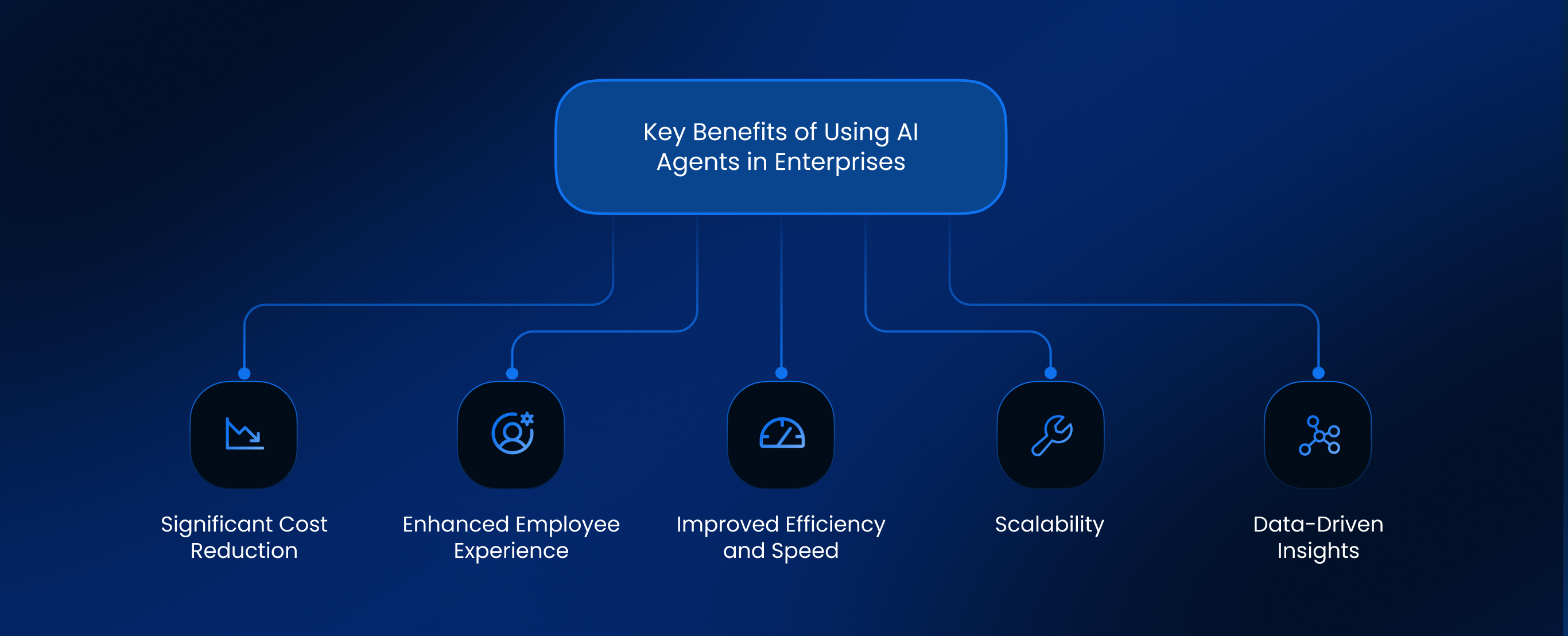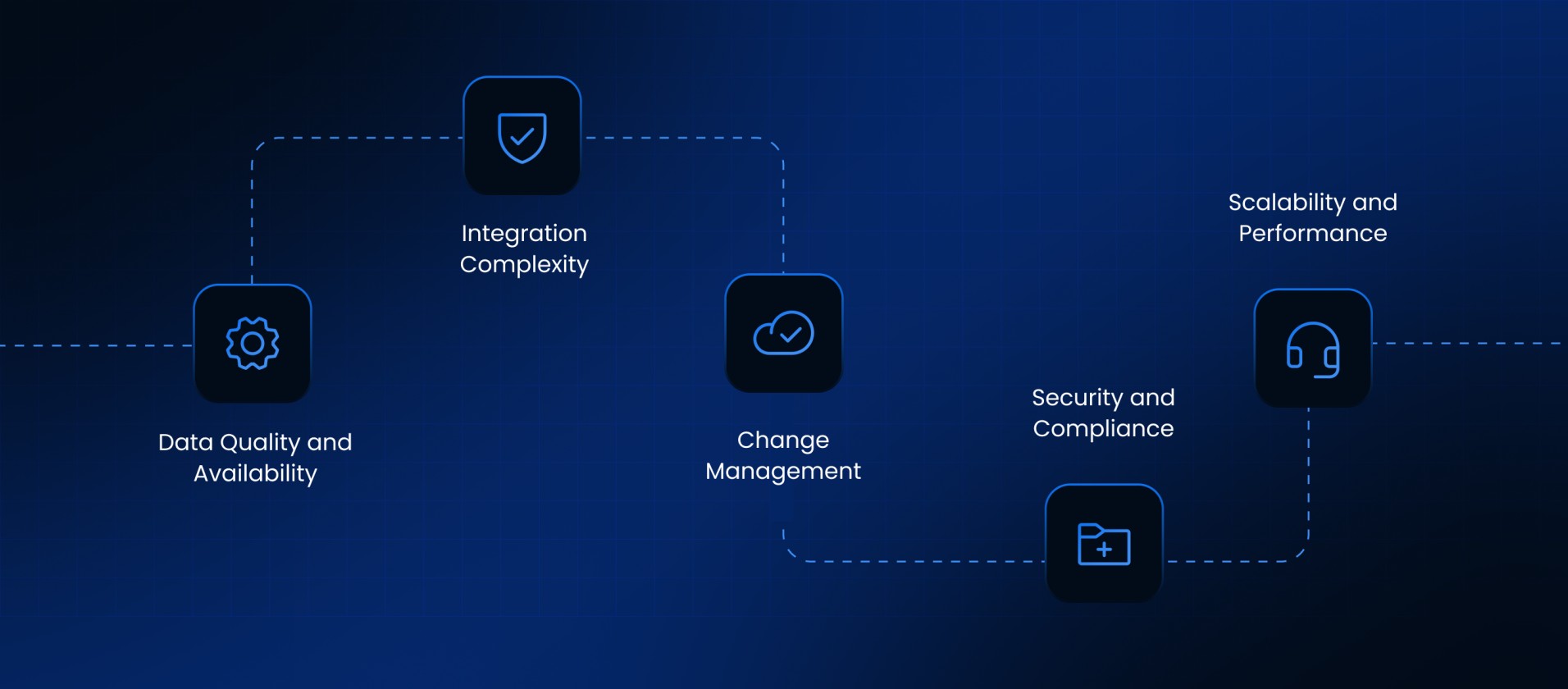Introduction
As a technology leader overseeing critical ticketing systems for a large US company, you’re constantly seeking innovation that delivers tangible results. You’re past the theoretical discussions; you want to see how emerging technologies translate into real-world efficiency and a superior employee experience. That’s precisely why we’re exploring practical examples of AI agents and their profound impact on enterprise operations.
The year 2025 demands more than just incremental improvements. It calls for a fundamental shift in how we approach internal support. This isn’t about replacing your teams; it’s about empowering them with a new class of intelligent automation that can resolve issues proactively, personalize interactions, and free up your human experts for strategic initiatives.
What are AI Agents?
At its core, an AI agent is a sophisticated software program designed to perceive its environment, make decisions, and take actions to achieve specific goals. Think of it as an autonomous digital assistant, but far more advanced than the basic chatbots of yesteryear. These agents don’t just follow pre-programmed rules; they learn, adapt, and execute multi-step tasks independently, often across various systems.
Unlike traditional automation, which typically follows a rigid script, AI agents possess a degree of intelligence that allows them to handle variations, unexpected inputs, and even ambiguity. For instance, if a user misspells a software name or describes a problem in an unconventional way, a well-designed AI agent can still understand the intent and proceed with a resolution.
How AI Agents Work
The magic behind AI agents lies in their ability to integrate several advanced technologies. They leverage large language models for understanding natural language, machine learning for pattern recognition and decision-making, and robust integrations to interact with your existing enterprise systems – be it your human resources information system, your financial planning software, or your IT service management platform.
Here’s a simplified breakdown of their operational flow:
- Perception: An AI agent constantly monitors various inputs, such as incoming support tickets, employee queries via chat, system alerts, or data from monitoring tools.
- Understanding and Reasoning: Using natural language processing and machine learning, the agent interprets the input, understands the user’s intent, and analyzes the context. It taps into vast knowledge bases, historical data, and even real-time system information.
- Decision-Making: Based on its understanding, the agent decides on the most appropriate course of action. This could involve finding an answer, executing a task, or escalating the issue to a human expert.
- Action: The AI agent then performs the chosen action. This might be providing information, triggering an automated workflow (like provisioning software), creating a new record in a system, or even proactively addressing a potential issue before it impacts anyone.
- Learning: Crucially, AI agents continuously learn from every interaction. Successful resolutions reinforce their knowledge, while failures provide data for improvement, making them smarter and more efficient over time.
Key Benefits of Using AI Agents in Enterprises
The advantages of deploying AI agents are transformative, especially for large organizations grappling with high ticket volumes and the demand for instant support.
- Significant Cost Reduction: By automating a substantial portion of routine inquiries and even complex multi-step resolutions, AI agents dramatically lower operational costs associated with help desk support. Think fewer human hours spent on repeatable tasks.
- Enhanced Employee Experience: In today’s competitive talent landscape, employees expect instant, accurate support. AI agents provide 24/7 availability and rapid resolution, reducing frustration and boosting productivity. This means less time waiting for IT to reset a password or for HR to answer a policy question.
- Improved Efficiency and Speed: Issues are resolved faster, often in minutes, rather than hours or days. This translates into less downtime for employees and quicker access to critical services.
- Scalability: Unlike human teams, AI agents can handle a massive, fluctuating volume of requests without compromising performance. During peak times, they can scale instantly to meet demand.
- Data-Driven Insights: AI agents generate a wealth of data on common issues, resolution times, and employee pain points. This data provides invaluable insights for optimizing services and identifying underlying systemic problems.

Common Examples of AI Agents
Let’s dive into some concrete examples of AI agents that are actively transforming how enterprises operate, particularly in the IT, HR, and Finance domains.
Autonomous Proactive Resolution Agents in IT
Imagine an AI agent that doesn’t just react to problems but prevents them. This is one of the most exciting examples of AI agents in 2025.
- Predictive System Maintenance: An AI agent integrates with your network monitoring tools. It detects an unusual spike in a server’s memory usage that, based on historical data, often precedes a critical outage. The agent automatically initiates a script to clear temporary files, restart a non-critical service, or even provision additional resources, resolving the issue before any user notices a slowdown or experiences downtime. The first “ticket” generated is a notification from the AI detailing the preventative action it took.
- Self-Healing Software Deployments: An employee installs a new software application, but the installation fails due to a dependency error. Instead of the user creating a ticket, an AI agent detects the failed installation, identifies the missing dependency, and automatically installs it. It then re-attempts the original software installation and confirms successful completion with the user, all without human intervention.
- Automated Account Unlocks and Password Resets: This is a classic example, but modern AI agents go beyond simply resetting. If a user tries to log in incorrectly multiple times, the AI agent can intelligently verify their identity through multi-factor authentication, unlock their account, and guide them through a secure password reset process without escalating to a human.
Context-Aware Conversational Agents in HR and Finance
Today’s AI agents offer a hyper-personalized experience, understanding the nuances of each employee’s situation.
- Personalized Onboarding Journeys: A new hire joins the company. An AI agent acts as their onboarding guide, proactively sending reminders about necessary paperwork, directing them to relevant training modules, answering questions about benefits enrollment, and even scheduling introductory meetings. It remembers their progress and tailors its responses accordingly.
- Intelligent Benefits Navigation: An employee asks about the specifics of their dental plan. Instead of simply pulling a generic PDF, the AI agent understands their specific plan tier, location, and family situation. It can then provide tailored information about in-network providers, deductibles, and even initiate a claim form request pre-filled with their details.
- Expense Report Automation and Policy Adherence: An AI agent integrated with your expense system can not only help employees submit reports but also proactively identify potential policy violations (e.g., an expense over the limit without prior approval). It can then communicate directly with the employee to request clarification or provide guidance on policy, significantly reducing the back-and-forth for your finance team.
Agent Augmentation and Operational Intelligence
AI agents aren’t just for end-users; they’re powerful tools for your internal teams. These are some of the most strategic examples of AI agents that directly impact your operational efficiency.
- Real-Time Support for Human Agents: During a complex IT issue or a sensitive HR inquiry, an AI agent acts as a co-pilot for your human support staff. It listens to calls or reads chat transcripts in real-time, proactively suggesting relevant knowledge articles, identifying similar past cases, drafting response snippets, and even flagging the customer’s sentiment (e.g., frustration) so the human agent can adapt their approach.
- AI-Driven Root Cause Analysis: Instead of human analysts manually sifting through thousands of tickets, an AI agent can analyze vast amounts of historical support data, system logs, and monitoring alerts. It identifies patterns and correlations that might indicate the true root cause of recurring problems. For example, it might discover that a recent surge in “application access issues” is actually tied to a specific network configuration change deployed last week to a particular office location, rather than individual user errors. These insights are invaluable for preventing future issues.
- Automated Knowledge Base Creation and Curation: After a human agent resolves a novel or complex issue, an AI agent can analyze the resolution steps and the conversation, then automatically draft a new, structured knowledge base article. It can also identify outdated articles, suggest updates, and ensure your self-service portal remains current and accurate.
Leena AI: Pioneering Agentic AI in IT, HR, and Finance
At Leena AI, we specialize in building enterprise-grade AI agents that deliver these kinds of transformative results. We understand that large US companies need solutions that are secure, scalable, and deeply integrated with their existing infrastructure. Our approach to “Agentic AI in IT” is designed to reduce the burden on your help desks, empower employees, and ensure seamless operations.
For instance, consider how Leena AI creates value:
- Intelligent IT Self-Service: Our AI agent can instantly troubleshoot common software issues, provision access to applications based on user roles, and resolve network connectivity problems, significantly reducing the volume of Tier 1 and even some Tier 2 tickets your IT team handles.
- Automated HR Support: From answering complex benefits questions to guiding employees through leave requests or policy inquiries, our AI agents provide personalized, always-on support, making HR services more accessible and efficient.
- Streamlined Finance Operations: Our AI agents can assist with expense reporting, invoice inquiries, and budgeting questions, ensuring employees adhere to policies and get quick answers to financial queries.
These are not just chatbots; these are sophisticated examples of AI agents that understand context, execute multi-step processes across various systems, and continuously learn to provide increasingly autonomous and proactive support. Our focus is on delivering measurable improvements in efficiency, employee satisfaction, and cost savings for your enterprise.
Challenges in Implementing AI Agents
While the benefits are clear, successfully implementing AI agents in a large enterprise environment comes with its own set of challenges.
- Data Quality and Availability: AI agents are only as good as the data they learn from. Ensuring high-quality, relevant, and accessible data across disparate systems can be a significant undertaking.
- Integration Complexity: Integrating AI agents with dozens, if not hundreds, of existing enterprise applications (like ERPs, CRMs, HRIS, and ITSM platforms) requires robust, secure, and flexible integration capabilities.
- Change Management: Introducing AI agents fundamentally changes how employees interact with support and how your internal teams operate. Effective change management and training are crucial for adoption and success.
- Security and Compliance: For large US companies, ensuring that AI agents handle sensitive employee, financial, and IT data in a secure and compliant manner (e.g., adhering to HIPAA, SOC 2, or specific industry regulations) is paramount.
- Scalability and Performance: The solution must be able to handle the immense volume and complexity of requests expected in a large enterprise without performance degradation.

Future of AI Agents
The evolution of AI agents is accelerating. Looking ahead, we anticipate several key trends:
- Increased Autonomy and Proactivity: Future examples of AI agents will show even greater ability to anticipate needs and resolve issues before they are reported, often initiating actions completely autonomously.
- Enhanced Emotional Intelligence: AI agents will become more adept at understanding and responding to human emotions, leading to more empathetic and satisfying interactions.
- Multi-Agent Collaboration: We’ll see scenarios where multiple AI agents, each specialized in different domains (e.g., one for IT, one for HR), collaborate seamlessly to resolve complex, cross-functional issues.
- Ethical AI and Trust: As AI agents become more prevalent, there will be an even stronger emphasis on transparent, fair, and accountable AI systems, ensuring they operate within ethical guidelines.
In conclusion, the strategic deployment of AI agents is no longer a futuristic concept; it’s a present-day imperative for technology leaders aiming to future-proof their operations. By focusing on practical examples of AI agents that deliver measurable outcomes, you can transform your enterprise support landscape, drive efficiency, and significantly elevate the employee experience.
Frequently Asked Questions about AI Agents
What are some real-world examples of AI agents in action?
You can see examples of AI agents handling tasks like automatically unlocking accounts, provisioning software, answering complex HR benefits questions, and even proactively preventing system outages by detecting and resolving anomalies before they impact users.
How do AI agents differ from traditional chatbots?
Traditional chatbots follow rigid scripts, whereas AI agents are more intelligent. They understand context, learn from interactions, make decisions, and execute multi-step actions across various systems, making them far more capable and autonomous.
What are the key benefits of using AI agents in an enterprise?
The main benefits include significant cost reduction through automation, improved employee experience with faster resolutions, enhanced efficiency, superior scalability, and valuable data-driven insights for operational improvement.
Can AI agents integrate with existing enterprise systems?
Yes, effective AI agents are designed to seamlessly integrate with your existing IT service management, human resources, finance, and other critical enterprise platforms to execute tasks and access necessary information.
What is the future outlook for AI agents in the workplace?
The future of AI agents involves greater autonomy, enhanced emotional intelligence, collaborative multi-agent systems, and a continued focus on ethical AI, leading to even more sophisticated and integrated support solutions.
How do AI agents help human support teams?
AI agents don’t just replace; they augment. Examples of AI agents assisting human teams include providing real-time suggestions during support calls, performing AI-driven root cause analysis, and automating the creation of knowledge base articles, freeing up human agents for more complex tasks.
Is implementing AI agents secure and compliant?
For large enterprises, security and compliance are paramount. Reputable AI agent providers ensure their solutions adhere to strict data privacy regulations and industry security standards to protect sensitive information.













